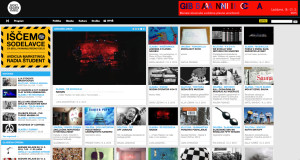In this bilungual show we introduce two unique projects: a common music digitalization project of the Music Museum of Iran and the University of Hildesheim and the reconstruction of the first broadcast of Radio Študent in Ljubljana from 1969 – by Helen Hahmann
People might think of gramophone records and magnetic tapes, when they speak about historical recordings. Questions of digitalization accompany lot´s of institutions. After all everybody who deals with audio-visual material searches for efficient methods to preserve and maintain archival documents.
In this broadcast we give the example of a music digitalization project run by the Music Museum of Iran and the Center of World Music of the University of Hildesheim in Germany. The etnomusicologist Samuel Mund talks about his work as the technical coordinator of the project.
Andraž Magajna was digging out old broadcasting manuscripts of slowenian Radio Študent. In 2009 people at Študent were able to reconstruct the first broadcast from 1969. The story told by Andraž shows clearly, that the Community Radios on Europe not only have to ask, how they can publish contemporary content on the internet, but also how it is possible to archive material all around the processes, productions and activities of free radios to enable the Radiocommunity to write their local histories.

/Beim Stichwort historische Aufnahmen, mögen viele Menschen an Schellackplatten, vielleicht sogar an Wachswalzen denken. Die Frage nach der Digitalisierung, also Konservierung, von Tondokumenten ist in vielen Bereichen immanent. Die Frage, wie man audio-visuelle Inhalte in zeitgemäße Datenformate konvertiert begleitet jede Person, die Archive anlegt oder pflegt. Am Beispiel des Digitalisierungsprojektes, das das Music Museum of Iran in Kooperation mit der Universität Hildesheim durchführt, wird deutlich, welche Aspekte beim Überspielen der Datenträger zur Diskussion stehen. Der Musikethnologe Samuel Mund vom Center of World Music in Hildesheim koordiniert das Projekt von der technischen Seite her. Radio CORAX sprach mit ihm auf der Konferenz ARCHIVIA14 in Linz. Andraž Magajna holte alte Sendeskripte aus den Archiven von Radio Študent in Ljubljana und rekonstruierte die erste Sendestunde von Študent 40 Jahre nach Erstausstrahlung zusammen mit einigen der früheren Radiomacher_innen. Ein Teil der Ton- und Schriftdokumente aus dieser Zeit liegen in Sloweniens nationalem Archivs. Andražs Bericht macht deutlich, dass sich für die Freien Radios in Europa nicht nur die Frage nach der Online-Bereitstellung von aktuellen Interviews stellt. Der aktive Umgang mit und die Archivierung von historischen Dokumenten, die die Geschichte jedes einzelnen Freien Radios dokumentieren, ist mindestens genauso wichtig./
All the music played on the show can be found at freemusicarchive.org and is published under Creative Commons license (January 2015).
download